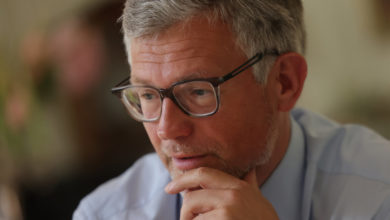Japan Considering Development of New Nuclear Reactors

TOKYO — Japanese Prime Minister Fumio Kishida on Wednesday instructed his government to consider developing safer, smaller nuclear reactors, signaling a renewed emphasis on nuclear energy years after many of the country’s plants were shut down.
Kishida made the comment at a “green transformation” conference on bolstering the country’s efforts to curb emissions of greenhouse gases. Japan pledged to achieve carbon neutrality by 2020.
Anti-nuclear sentiment and safety concerns rose sharply in Japan after the 2011 Fukushima nuclear plant disaster, but the government has been pushing for a return to nuclear energy amid worries of power shortages following Russia’s invasion of Ukraine and a global push to reduce greenhouse gases.
However, the government previously stated that it did not plan to build new reactors or replace old ones, apparently in order to keep from drawing criticisms from an enquiring public. Kishida’s comment on Wednesday represents a sharp change from that stance.
He said the panel presented proposals for the development and construction of “new innovative reactors designed with new safety mechanisms.” He called on the government to speed up its examination of “every possible measure” and reach a decision by the end of the year.
“In order to overcome our imminent crisis of a power supply crunch, we must take our utmost steps to mobilize all possible policies in the coming years and prepare for any emergency,” Kishida said.
“It is extremely important to secure all options to redesign a stable energy supply for our country,” Economy and Industry Minister Yasutoshi Nishimura told reporters. “From that perspective, we will also consider all options regarding nuclear power.”
Most of Japan’s nuclear power plants were taken off line following the Fukushima accident for safety checks under tightened standards.
In March 2011, the Fukushima Daiichi nuclear power plant was hit by a tsunami and an earthquake of magnitude 9.0. Key cooling systems were destroyed at Fukushima Daiichi. Three reactors melted, contaminating some parts with large amounts of radiation.
Japanese utilities set up more than 20 reactors to be decommissioned since the beginning, partly due to high safety standards. The Nuclear Safety Authority has screened 25 of the 33 reactors that are currently available for decommissioning. Seventeen of the 33 reactors that are available have been approved. However, only 10 reactors have resumed operation after receiving approval from their local communities.
Already, plans have been announced by the government to increase restarts. The goal is to restart up to 9 reactors before winter in order to deal with the current energy crisis. The government plans to start seven more reactors next summer, and extend the operating life of older reactors beyond the original 40 years.
According to some energy professionals, so-called “next-generation” reactors (small modular reactors) could prove costly, adding a significant financial burden for plant owners.
Toyoshi Fuketa, commissioner of Japan’s nuclear watchdog, the Nuclear Safety Authority, told reporters on Wednesday that his agency’s safety standards are not affected by the government’s nuclear energy policy. He said that Japan doesn’t have any safety standards in place for the next generation of reactors. It would take over a year to establish such guidelines. However, safety concerns regarding older reactors need to be thoroughly examined.
Critics claim that the real cost of nuclear power would rise if radioactive waste disposal and storage costs are added. They also believe there could be long-term health risks from another Fukushima like accident. They also say Russia’s attacks on a nuclear plant in Ukraine show they are a potential security risk and need to be better protected.
Tokyo Electric Power Company Holdings has been accused of failing to protect a plant at Kashiwazaki-Kariwa. This plant is where Tokyo Electric Power Company Holdings seeks to start two more reactors. These reactors are one of seven the government is looking to restart quickly.
Here are more must-read stories from TIME




